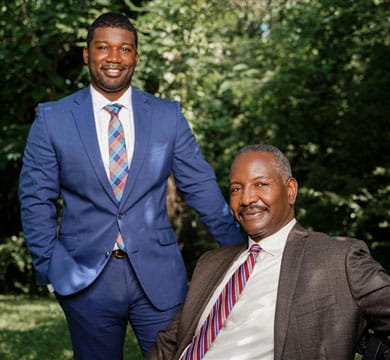Building wealth and trust in the black community
For Thomas and Terrance Dedrick, understanding the importance of legacy and financial literacy is key to creating Black generational wealth.

For a school project about what he wanted to be when he grew up, a young Terrance Dedrick drew a picture of himself sitting at a desk along with the words “financial consultant.”
“My plan was always to become an advisor,” Terrance said, “because that’s what I saw growing up.”
Not coincidentally, Terrance’s father – and now, colleague – Thomas has been advising clients for more than 40 years. As the first Black financial advisor in Tuscaloosa, Alabama, he has come to understand the importance of setting an example, and seen how his career has inspired the next generation – and not just his own family.
“As they say, ‘be it so they can see it,’” Thomas said.
“Creating wealth, presenting a positive image in the neighborhood, and family – to me, that’s how you create a legacy. You make sure you do what’s right and you mentor others to give them the opportunity to add on to what you’ve accomplished,” Thomas said.
Building trust
Thomas is a member of 100 Black Men of West Alabama, a youth mentoring organization dedicated to teaching the skills of economic prosperity and leadership. Through the organization, Thomas educates high school students about a number of finance related topics such as the difference between traditional banks and payday lenders and the importance of insurance.
“Sometimes you have to start with the younger minds which are willing to hear what you have to say versus the parent who has done it their way for a long time and may have some apprehension about people in our industry and investing in general,” Thomas said.
While financial literacy can be challenging for anyone, that challenge can be amplified in the Black community because of a historical lack of access to capital, financial services and information.
“There was a distrust of the banks and financial advisors because you didn’t have people who looked like you and you didn’t know if they were looking out for your best interests,” Terrance said. “Investing is foreign to those families, so they’d just put their money in a piggy bank and call it a day. That’s not how you grow wealth.”
Thomas emphasized the importance of taking the time to develop trusting relationships with potential clients.
“There’s a process of building trust and making sure they understand we not only have the technical knowledge, but we also have the desire to help them be successful,” he said. “If you don’t make sure people understand you truly care, it’s tough to have lasting relationships.”
Early in his career, if Thomas could gather two or three people he would do a presentation, “because I had to talk to people.” He recalled one meeting at a doctor’s home that earned a lot of positive feedback, but no business – at least not right away. But five years after the presentation he got a call from someone who had been there and was interested in becoming his client.
“I think part of it is a lack of experience and exposure, and there’s the question of trust,” he said. “After five years, perhaps they’d seen that I was still around and had a good reputation, and they felt confident enough to give me an opportunity. The lead time is often longer in our community.”
Overcoming obstacles to black wealth
When meeting with their Black clients the conversations will often veer away from strict economics to legacies and ensuring each generation has an opportunity to benefit from the experiences of the last, Thomas said.
For example, one challenge Thomas sees in the Black community is business owners not having a designated successor.
“The business may be very successful,” he said, “but when the creator no longer wants to run it, they don’t have anyone who wants to take over and grow it.”
Thomas and Terrance also emphasized the delicate balance some wealthy clients face in wanting to provide for their children but not spoil them.
“Before a meeting, they’ll say, ‘Look, you can talk in generalities but don’t give any specifics,’ because they want their kids to have a desire to succeed on their own,” Thomas said.
Terrance added: “There’s also the flip side of that. Let’s say the parents don’t want to have in-depth conversations about their finances, yet. In that case we give them a legacy binder that contains all their financial information for when the unexpected happens. The last thing you want to be doing during that time is trying to figure out where everything is and who you need to speak to.”
“People often don’t realize the importance of communicating that information until you work with a family and see it falling apart at the seams,” Thomas said.
Leaving his own legacy
Looking ahead to his own legacy, Thomas heeds his own sage advice.
“I want to make sure I share what my vision is for the foundation I laid going forward,” he said. “I’ve been blessed with two sons, both of whom are working with me.”
While Terrance started working in financial services straight out of college, Thomas’ eldest son, Wayne, “took the long route” and is currently a client service associate working his way into advising.
“My goal is for Terrance and Wayne to take over and grow the practice into something more than I ever imagined it being,” Thomas said. “And, hopefully, I’ll be able to stop by and visit every now and then and have a cup of coffee.”
Follow along on social media with #RJBFAN.